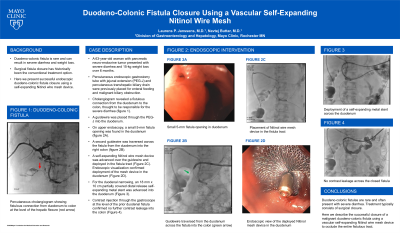Tuesday Poster Session
Category: Endoscopy Video Forum
P3228 - Duodeno-Colonic Fistula Closure Using a Vascular Self-Expanding Nitinol Wire Mesh Device


Laurens Janssens, MD
Mayo Clinic
Rochester, MN
Presenting Author(s)
Mayo Clinic, Rochester, MN
Introduction:
Duodeno-colonic fistula is a rare entity that can result in severe diarrhea and weight loss. Surgical fistula closure has historically been the conventional treatment option. In this case, we present successful endoscopic closure of a duodeno-colonic fistula using a vascular self-expanding Nitinol wire mesh device.
Case Description/Methods:
A 63-year-old woman with a history of metastatic pancreatic neuro-endocrine tumor presented with severe diarrhea and 15-kg weight loss over the past 6 months. A percutaneous transhepatic biliary drain, an internal biliary stent, and a percutaneous endoscopic gastrostomy tube with jejunal extension (PEG-J) had been placed previously for malignant biliary obstruction and enteral feeding. During biliary drain check, a fistulous connection was noted from the duodenum to the colon at the hepatic flexure and was thought to be responsible for the patients’ severe diarrhea (Figure 1A).
Upper endoscopy showed intact gastrostomy with jejunal extension into the duodenum. A guidewire was passed through the PEG-J into the jejunum and the PEG-J tube was consequently removed. An 8 cm long strictured duodenal ulcer with exposed and separated muscle fibers was found in the first and second portion of the duodenum with a 5-mm fistula opening in the second portion. Contrast injection confirmed the presence of the duodeno-colonic fistula. Under fluoroscopic guidance, a second guidewire was traversed across the fistula into the right colon, followed by advancement of a delivery catheter over the guidewire into the right colon. The guidewire was then removed, and a self-expanding Nitinol wire mesh device (AMPLATZERTM Vascular Plug II) was advanced through the delivery catheter and deployed in the fistula tract (Figure 1B). Next, an 18 mm x 10 cm partially covered distal release Ultraflex stent was advanced over the initial guidewire (into the jejunum). Contrast injection in the proximal duodenum confirmed no further contrast leakage into the right colon at the end of the procedure.
Discussion:
Duodeno-colonic fistulas are rare complications that can arise secondary to both benign and malignant gastrointestinal diseases. Diarrhea is the most prominent symptom and treatment typically consists of surgical closure. Here we describe the successful endoscopic closure of a malignant duodeno-colonic fistula using a vascular self-expanding Nitinol wire mesh device to occlude the entire fistulous tract.

Fig 1B: Deployment of a self-expanding Nitinol wire mesh device in the fistulous tract.
Disclosures:
Laurens Janssens, MD, Navtej S. Buttar, MD. P3228 - Duodeno-Colonic Fistula Closure Using a Vascular Self-Expanding Nitinol Wire Mesh Device, ACG 2023 Annual Scientific Meeting Abstracts. Vancouver, BC, Canada: American College of Gastroenterology.
